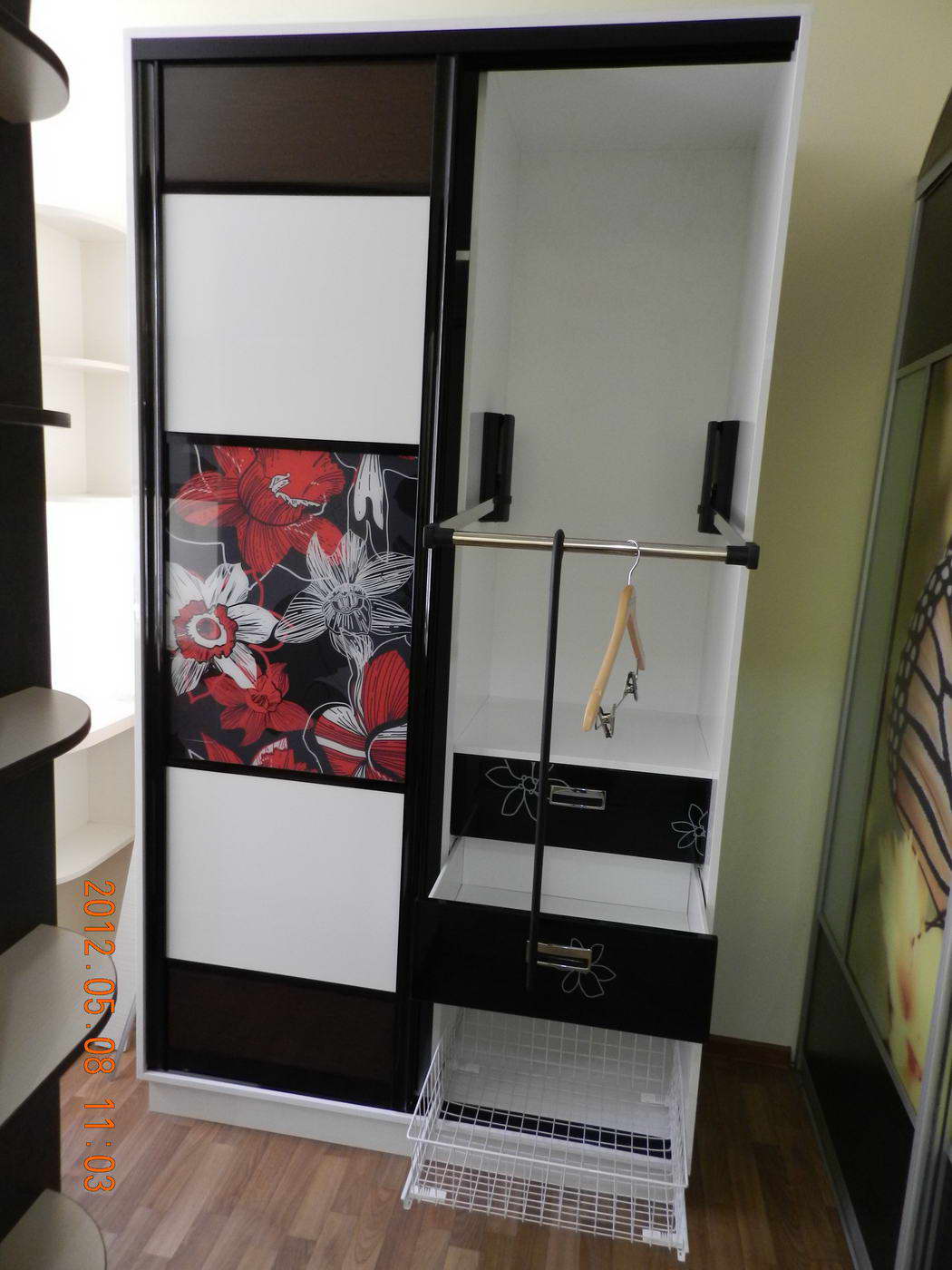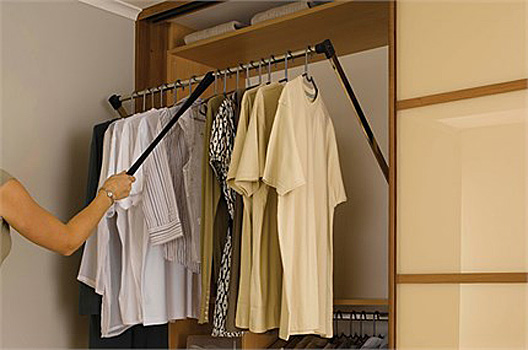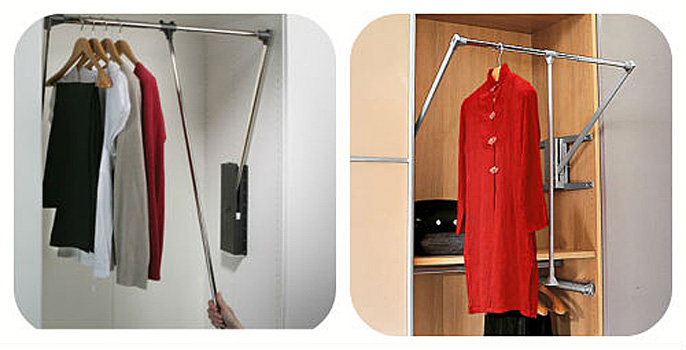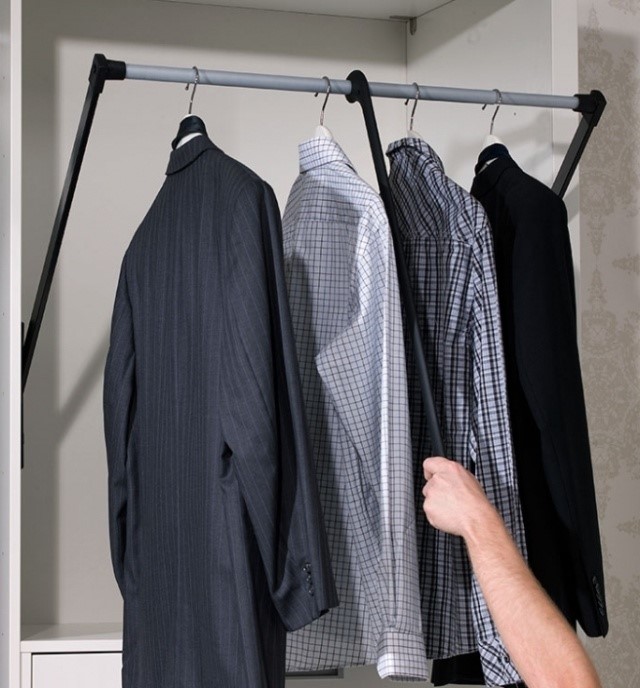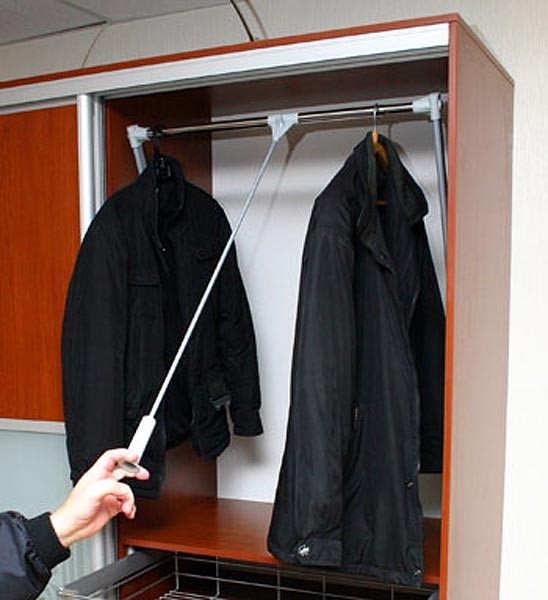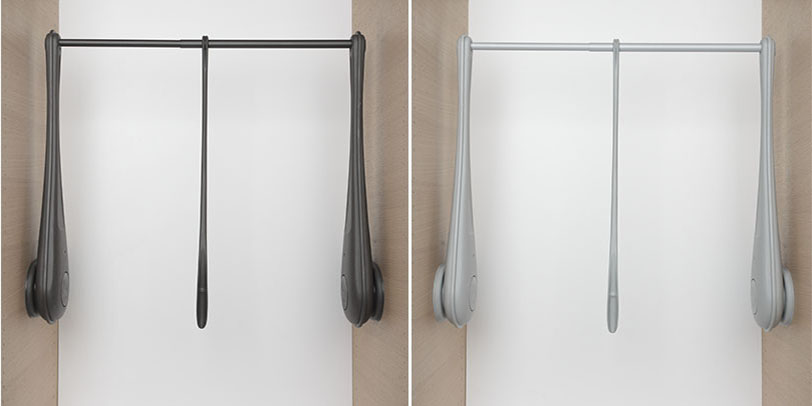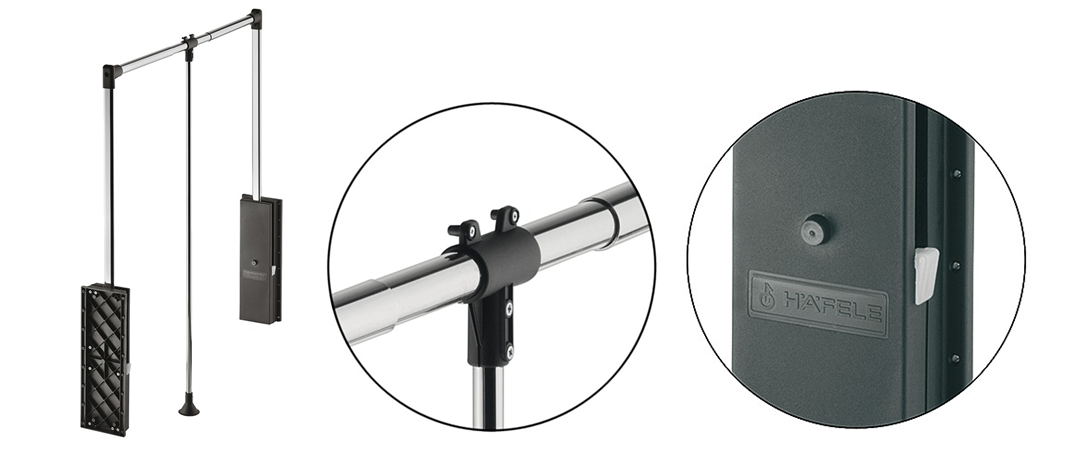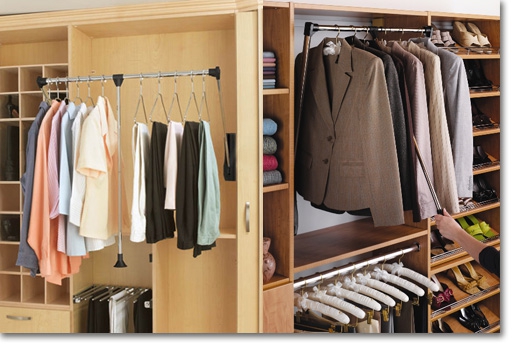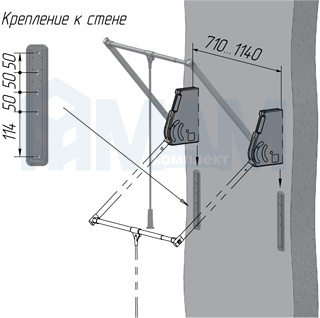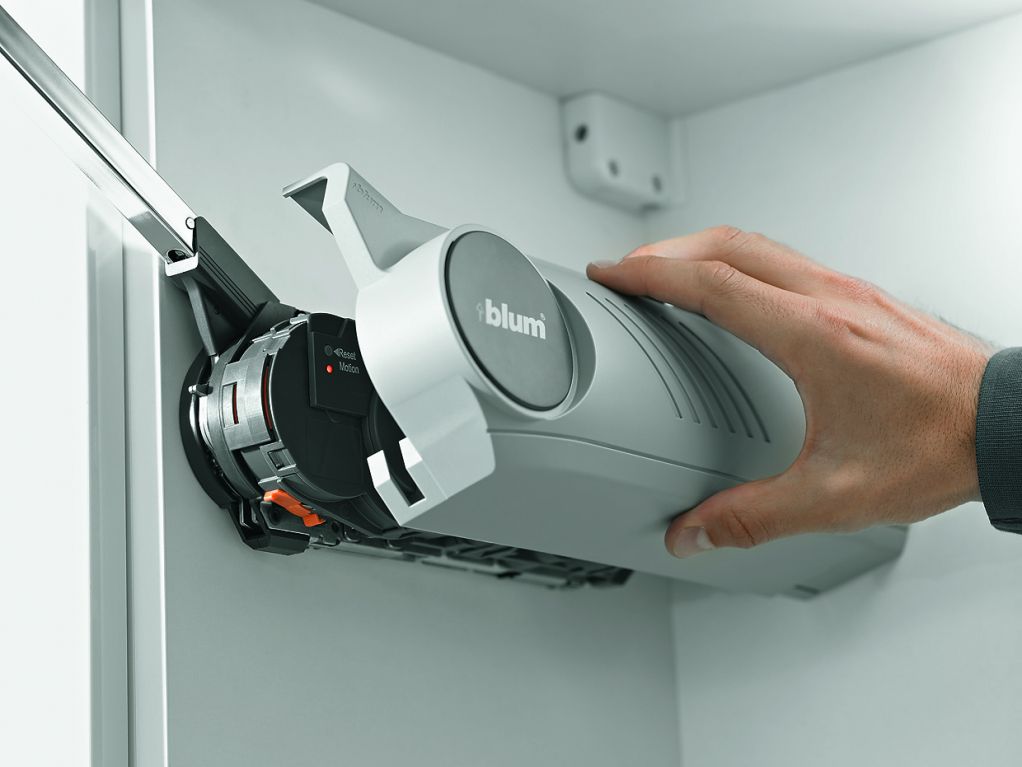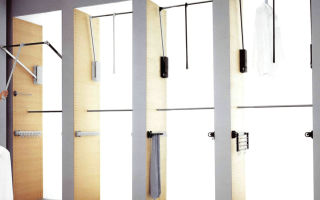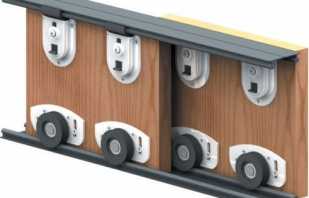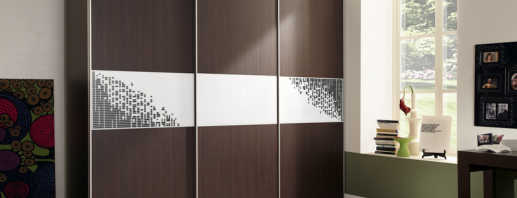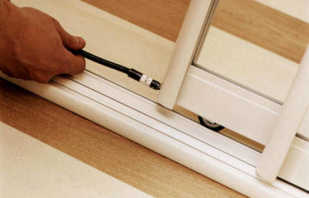Overview of pantographs in a closet, selection rules
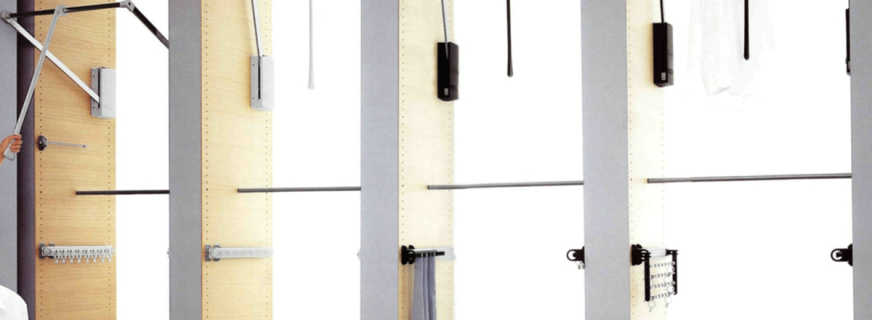
Thanks to the successful selection of a sliding wardrobe or dressing system for the bedroom, living room, children's room and even the corridor, you can significantly save living space. This becomes especially important in a small apartment, the area of which is very small. The high functionality and practicality of such furniture cannot be ensured without thoughtful internal content, and pantographs for sliding wardrobes are one of the important elements.
Content
Purpose and principle of action
Pantographs for sliding wardrobes are a U-shaped structure made of durable metal. It is needed as part of a sliding wardrobe to improve its performance. Thanks to the pantograph, it becomes much more convenient to use the cabinet. You can deliver clothes to the upper compartment of the structure autonomously and without any special difficulties. In addition, this product allows you to rationally zoning the case for the current season.
Manufacturers in the process of manufacturing pantographs use high-strength metals, which allows the product to withstand significant loads during operation. Therefore, even with rather heavy outerwear, one should not worry about the quality of furniture; the pantograph will not break.
If we consider the structure of this element of the cabinet, we can note its main elements:
- sliding bar;
- handle for control;
- side levers;
- boxes with slots for levers to fix the element in a certain position.
The mechanism operates as follows: you can lower the bar with things using the handle. When you press it, the moving levers bent the plate, and those forcefully pushed up the structure.
Varieties
If the room of a bedroom or a child’s room does not differ in impressive size, and the person’s wardrobe is quite large, you need to think about how to comfortably place it. You can pick up a small, but tall cabinet, and place clothes and accessories in two tiers inside it. And access to the second tiers is provided with the help of a pantograph.
Today, the domestic furniture market has sliding wardrobes with different types of pantographs inside the structure. These products differ among themselves by the material of manufacture, the mechanism of functioning. We describe the most popular categories below.
Mechanical
When choosing a wardrobe in your home, it is important to think about the type of pantograph, which is important to equip such furniture. Such a mechanism will provide a person with access to the highest corners of the cabinet, rationally planning its internal content. In addition, the pantograph on the mechanics allows you to give the clothes inside the structure a neat appearance, to prevent it from wrinkling. Blouses and jackets, trousers and dresses will be aesthetically placed on the shoulders.
If the family budget is limited, a mechanical pantograph is quite suitable for these purposes. This is a type of pantographs, in which the lifting mechanism is equipped with springs that easily return the levers to the current position.
The main operational parameters of such mechanical type products are presented below.
| Characteristic | Value |
| Carrying capacity | 10-20 kg |
| Allowable Rod Width | 450-1250 mm |
| average cost | From 2 thousand rubles |
Electric powered
Electric clothes lifts are more convenient to use, since you don’t need to make any effort to access clothes on hangers. It is enough to press the button, which starts the motor in the design of the closet. The bar with hangers is lowered, and a person can get the actual outfit without additional difficulties. When the need for access to things disappears, pressing the button will return the pantograph to its original position. Such a mechanism is especially relevant in a children's room, because it will be much easier for a child to use it than a mechanical option.
A more comfortable pantograph costs decent money, so electric models are less common than options on the mechanics. The average cost of a quality product starts at 7 thousand rubles. In addition, only an experienced specialist should install such a system, otherwise you can make a mistake and break the mechanism.
Production material
Pantographs for sliding wardrobes of different sizes must certainly be durable, resistant to stress, because the cabinet itself is bought for more than one year, so all its internal filling must have high operational parameters.
Often, for the manufacture of modern pantograph models, durable metals are used: chrome, aluminum and others. This provides the product with the ability to withstand a significant load, not to break, to serve as long as possible. The weight that a metal pantograph can withstand is between 10-20 kg. If clothes on hangers weigh more than 20 kg, then the product will simply become worthless. Therefore, when planning the space inside the wardrobe, it is important to consider this fact.
Rules for placement and operation
If a sliding wardrobe is selected in a furniture store or made to order, most likely, installation of a pantograph will be done by the hands of the master. However, if you want to increase the functionality of the old home cabinet, you can install this mechanism yourself.
First you’ll have to study the location of the shelves inside the sliding wardrobe. If there is no niche for placing clothes on hangers, dismantle several shelves. If there is a niche, stock up on relevant tools:
- measuring tape, simple pencil;
- with a screwdriver;
- magnetic holder, bits for hardware;
- drill 3 mm;
- hex key.
After the list of tools is prepared, begin the installation of the mechanism. To determine the current location of the crossbar, think about what clothes will hang on it. If dresses, a coat, a horizontal bar are mounted at a level of 1-1.2 m from the lower shelf. If only jackets, blouses - at the level of 0.8 m.
It is extremely important to determine the lower level of the product, for which you need to measure its height (from the bottom of the box with a lifting mechanism) and add another 30 mm to this value.
To make the installation more reliable, high-quality, and the design can withstand the maximum weight, it is important to drill racks for self-tapping screws. When fixing the mounting strips and levers to the side wall of the cabinet and installing the rod with the handle, it is important to accurately match the holes in the strips and the previously prepared blind holes in the partitions. It is important not to confuse the right-side and left-side levers, and also not to overdo it with pressure when screwing in the screws. Otherwise, the work will have to be repeated first.
As for the operating rules, they are simple. It is important not to overload the design, specifying in the instructions the maximum allowable weight of the clothes.
How to choose
When choosing a pantograph in a closet, it is important to be guided by the following criteria:
- price and management principle. Mechanical models are slightly cheaper than electric ones. And overly cheap products should scare the buyer in both cases. Most likely, a cheap product will lose its functionality very quickly;
- quality - the selected product must certainly be made of quality materials, otherwise it will last a short time. Ask the seller for a quality certificate. Products without such a document in the kit are not worth the attention of buyers;
- Dimensions - Carefully measure your sliding wardrobe with a construction tape measure. This will determine the actual size of the pantograph.
If experience in such matters is minimal, you can seek help from an experienced specialist. He can perform the installation of the product.
Video



